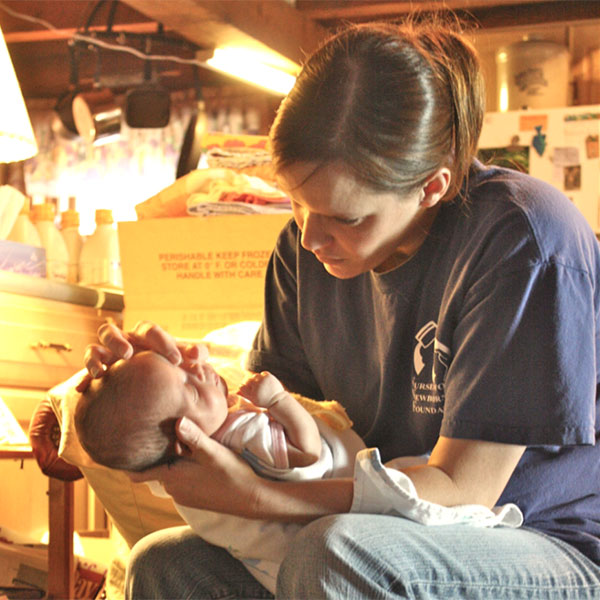Nurses for Newborns Setting the Standard for Nurse Home Visiting
Sharon Rohrbach was becoming increasingly frustrated. Time and again, the newborn nursery nurse at St. Anthony’s Medical Center in South St. Louis County (now Mercy South) would see newborns that had just been released from the hospital return to the emergency room with preventable injuries and illnesses. So, as founders do, she went into action and convened a group of fellow RNs to visit families in those critical early days of parenthood. Thirty years later, the model for Nurses for Newborns (NFN) home visitation program has advanced through federal government standards.
“We’ve had great interest in our program from researchers and other providers because it works,” says Melinda Monroe, Nurses for Newborns CEO. The organization’s outcomes bear this out, with 98% of families avoiding safety-related injuries and preventable hospitalizations, and 95% avoiding unnecessary visits to the ER – the vision of Rohrbach all those years ago.
“Nurses for Newborns has set the standard for nurse home visiting, a method of support that YouthBridge believes has enormous benefits,” says Barbara Carswell, YouthBridge CEO. It’s why YouthBridge recently invested $240,000 in a Home Visiting Collaborative spearheaded by Generate Health that is seeking to streamline referrals, coordinate training, share best practices and “generally create a tighter community of support among home visiting agencies in the region,” she says. “We also partner on this issue with a client that gives substantially to NFN, because they care about infant mortality and want to see all children thrive.”
The formula for NFN’s success, says Monroe, is eliminating barriers to health care and education, such as transportation and finances, empowering families and being flexible to all kinds of needs. “Some agencies are limited to serving families in a certain income level or first-time parents, but we keep our arms open wide to any family needing support because there is always some stress around the birth of a new child,” she says. NFN serves about 2,000 families each year, none of whom are charged for services.
When referred to the agency (typically by a hospital, clinic or social service agency), families are assigned a pediatric nurse responsible for assessing the physical and mental health of mom and baby, working through a care plan, connecting them with resources and educating them on health and safety. Services can begin before the birth and continue up to two years after – or merely consist of a couple of visits – again, flexible to the unique needs of each family.
“While we assess and address medical problems and ensure families have basic necessities like diapers and formula, our main purpose is to teach them how to be the best parents possible,” says Monroe. “Much of neglect and its consequences are born out of not knowing, so we always lead with education.”
From the first visit, the visiting nurses are teaching safe sleep practices, CPR and other emergency aid, how to identify risks in their environment, when to call for help and more. Safe sleep is a particular focus, says Monroe. “The science has evolved so much and not everyone is aware of current guidelines, which basically follow ‘ABC’: sleeping alone (without blankets, toys, etc.), on their backs and in a crib or other safe place.” The guidelines have cut infant deaths from SIDS (sudden infant death syndrome) in half, she says.
Over time, the importance of mental health – in both mom and baby – also has been acknowledged and become a central focus. Monroe recalls a mom that was “flattened” by depression. “It happens and fortunately we were there to get her the treatment she needed, encourage her, help her prioritize herself so that she could be a healthy caregiver to her baby, and to monitor her progress.” She says there also is a growing body of knowledge around infant mental health and identifying when bonding is not going well or the child is not advancing in their emotional development.
Holding a master’s degree in clinical development psychology, Monroe has spent her 30-year career advocating for the healthy growth of infants and families. She also is a foster/adoptive parent, including raising a son that started life at two pounds. “Seeing firsthand the power of early intervention fuels me above any line on my resume or degree on my wall,” she says.
If you would like to donate or have any questions about this organization, please contact Allison McDonald.
